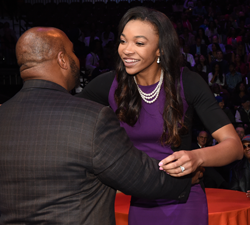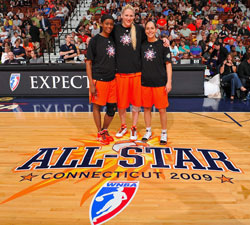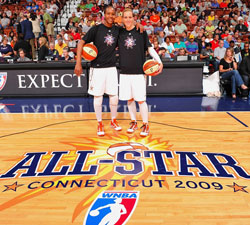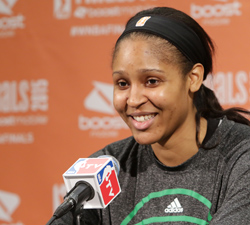Q&A With Seattle Storm Co-Owner Ginny Gilder
Ginny Gilder is co-owner of the Seattle Storm. She was also a member of the American women’s quadruple sculls team that won the silver medal at the 1984 Summer Olympics. An inspirational figure, Gilder recently completed a memoir. For more information of Gilder’s book, CLICK HERE
WNBA.com. What made you want to write this memoir?
Ginny Gilder: For so much of my teen and early adult years I felt really alone. I was so afraid and anxious much of the time. But, I guess, one of the things I learned young was the need to show a tough face — both because I thought I was supposed to be tough, and also because I felt wrong for feeling so afraid. So, really, I wrote the book because I don’t want others to feel as isolated as I did, but to recognize that they can pursue their dreams without hiding themselves and being afraid of failing. So, I really say that writing this book is an expression of my core purpose, which I view as connecting with other people to support them both to dream big and do whatever it takes to deliver on their own personal aspirations.
Q. Is there an overarching message that you want readers to come away with when they read the book?
GG: There’s a couple. One is don’t let your fear run your life, and the other is don’t let anyone tell you what you can be or who you should be.
Q. Did the challenges you faced early in life prepare you for the stand you and others were able to take during your freshman year at Yale?
GG: In some ways, yes, and in some ways, no. Those family problems, which probably everybody has, certainly made me tough, but there was a pretty high price to pay for it. I would say what really prepared me for what happened at Yale was actually what happened at Yale, in some ways, and also before in terms of the relationships that I developed. First at school, I found myself in this very powerful group of women in college, and that in itself just gave me a lot of strength and just taught me a lot. Before that, I think just in general, not family tragedy but going through the normal parts of life of learning how to do things and learning how to rely on myself and seeing that when something is hard I could still get through it if I just kept going probably taught me a lot.
Q. After Yale you faced some other obstacles on your way to earning an Olympic medal. How rewarding was that after what you had been through in those previous years?
GG: You know, I have a different perspective on it now than I did then. I think then I was somewhat satisfied, but I had really wanted to race in the single, not the quad, and because I had badly injured myself that didn’t happen. So, in some ways I was disappointed. I didn’t say that to anybody at the time, but I felt like I hadn’t done what I had set out to do. It’s only with a lot of time passing that I realized that my standards were just ridiculous and that it was an amazing experience. It was an amazing experience at the time as well, but then when I was reflecting back on it within the following few years, I tended to look at what I had accomplished as not quite good enough.
Q. What has been your favorite part of the process that went into writing this book, getting it together and then getting out and meeting people who have read the book?
GG: There’s not one favorite part. I’ll tell you the things I’ve liked the most so far. The first part is writing. I’ve never done anything quite as intellectually stimulating, and I worked with some people who really taught me a lot about writing. And just like when I started working with my publisher, I worked with another great editor and that process of doing something important in a small group I just love. It’s just like anything. It’s just like rowing. It’s like owning our WNBA team. I love being part of a team, so that was incredibly satisfying. And then what I’ve already started to discover as people have been reading the book and getting in touch with me is that, in fact, it’s touching people and it’s helping people think about their own lives and how they might want to express themselves more authentically. And that is an incredible gift that people are willing to let each other be touched.
Q. The Seattle Storm has the first pick in the WNBA Draft for the first time in quite some time. What is the team looking for in a top pick?
GG: Nobody gets the No. 1 pick in the draft or one of the top picks without having struggles in the previous season. We’ve had an incredible run with our first franchise stars, Sue [Bird] and Lauren [Jackson], and now it’s time to rebuild and that’s what we’re doing. So, we’re looking to bring youth in that can ignite our next decade. There’s certainly some talent in this draft and we’re very, very excited.
,xPosition=.5,yPosition=.5)
,xPosition=.5,yPosition=.5)
,xPosition=.5,yPosition=.5)
,xPosition=.5,yPosition=.5)